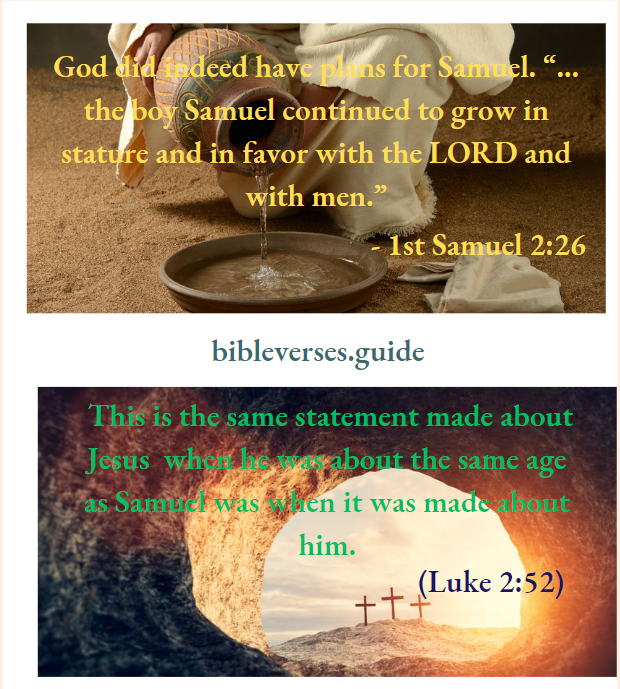Book 9 The Book of 1st Samuel
When was it written: Sometime after the division of the kingdom of Israel in 930 B.C.
Why was it written: The book of 1st Samuel was written to take us through the end of the period of judges and to introduce us to the establishment of kingship in Israel with the anointing of King Saul. The book of 1st Samuel also tells of the struggles that made up Saul and David’s relationship.
The Book Of 1st Samuel Carries Several Important Messages We Should All Take To Heart (In No Particular Order Of Chronology Or Importance):
- God blesses those who are obedient to him
- God uses extreme and implausible measures to accomplish his goals and purposes
- Sin and weakness don’t have to define us—we can change
- God sees beyond the surface of our exterior appearance to see our hearts, and that is what he is most concerned about
Read and Learn More Bible Study For Beginners
Obedience to God results in an abundance of blessings The book of 1st Samuel is one of intrigue, excitement, drama, acts of compassion, joy, sadness, and miraculous works of God. As we look at several of the events written about in the pages of this book of the Old Testament, remember this: nothing is too big for God and with God all things are possible.
The Miracle Named Samuel
The book of 1st Samuel begins by introducing us to a couple whose names are Elkanah and Hannah. Elkanah was descended from the tribe of Ephraim, the son of Joseph, who Jacob gave a special blessing to.
Elkanah and Hannah loved one another very much, but Hannah was miserable because she was not been able to have children. She prayed diligently and desperately for a child, but her prayers went unanswered until the priest (who also served as Israel’s judge) saw Hannah sobbing and praying at the temple in Shiloh.
When Eli saw Hannah praying from a distance, he thought she was drunk and approached her for the purpose of chastising her for her actions. But when he saw Hannah up close and listened to the sincerity in her voice, he assured her that whatever it was she was praying for, God would give her.
Less than a year later Hannah gave birth to a son and named him Samuel, which means, “Because I asked the LORD for him”.
Hannah’s faithfulness and obedience to God were demonstrated on an even greater level when she took Samuel to the temple while he was still a little boy (probably about 3 years old) and left him there to live with Eli and to be raised up to become Israel’s final judge.
Each year Hannah would visit her son and bring him gifts and things he needed. And each year Eli would pronounce a blessing on Hannah and Elkanah for their faithful and selfless deed—pronouncements that resulted in being blessed with three more sons and two daughters.
God Calls Samuel
Eli was already an old man by the time Samuel came to him to be raised in the temple. But knowing he didn’t have many years left and knowing his own two sons were evil and had no business taking on the role of priest, gave Eli the strength and desire to pour all he could into Samuel. He wanted very much to prepare Samuel to be God’s willing servant.

God called Samuel directly late one night while Samuel was in bed. Samuel thought it was Eli calling him, but after going to Eli a third time after thinking he heard Eli calling for him, Eli realized it was God’s voice Samuel was hearing.
Eli told Samuel to answer, “Speak, LORD, for your servant is listening”. Samuel did what Eli told him to do and from that day on the LORD was with Samuel.
Samuel lived the rest of his life leading Israel in the ways of the LORD.
The Ark Of The Covenant
The Ark of the Covenant which God had instructed the craftsmen to build had stayed with the Israelites since the day it was placed in the Tabernacle. It had been carried over the Jordan River before the Israelites crossed over to enter the Promised Land and during the time Samuel was living under Eli’s tutelage, the Ark of the Covenant resided in the temple at Shiloh.
It was during this time that the Philistines and Israel went to battle and the Philistines defeated Israel. This led to the Israelite’s decision to take the Ark of the Covenant into battle with them. This proved to be a grave mistake because the Philistines stole the Ark of the Covenant and killed several Israelites—including Eli’s two sons.
When Eli heard of his sons’ deaths, he surely felt some sense of grief, but when Eli learned that the Ark of the Covenant had been stolen, he fell out of his chair, broke his neck, and died (at the age of ninety-eight). The forty-year leadership of Eli had come to an end and Samuel was now the leader of all of Israel.
Samuel’s ‘official’ role as leader of Israel didn’t start out on a very positive note, due to the loss of the Ark of the Covenant, but it didn’t stay gone for long. God’s anger had been riled and his hand was raised against the Philistines.
God destroyed the idols of their gods and caused the people to be afflicted with tumors. The people panicked and were terrified of the God of the Israelites and returned the Ark of the Covenant to the Israelites so that it could be put back in its rightful place.
Israel Wants A King
When Samuel got old and realized he didn’t have many years left here on earth, he appointed his two sons, Joel and Abijah, to take over his role as judge and leader of the Israelites. But Joel and Abijah were not as resolute or sincere in their faith as their father was and the people were not willing to accept them as their leaders. Instead, they wanted a king.
Samuel was against the idea and felt it would take them even farther away from their faith and dependency on God, but they would settle for nothing other than a king, so after Samuel consulted God on the matter, he appointed Saul, a young man from the tribe of Benjamin, to be the first king of Israel.
Saul As King
God chose Saul to be king of Israel with the intention of establishing Saul’s family as the royal family of Israel for generations to come. There was nothing especially special about
Saul from a human point of view. He wasn’t skilled in military leadership. He wasn’t exceedingly wealthy. He didn’t possess above-average intelligence. He was a Benjamite—the smallest of the tribes of Israel.

Saul did not remain in God’s favor for very long, however, because Saul chose to do things his way instead of God’s way. But because God had promised Saul he would be king, he allowed Saul to sit on the throne of Israel for his lifetime (from the age of 30 to the age of 72).
Both his reign and his personal life, however, were filled with strife, paranoia, sadness, and general dysfunction.
As you read through the book of 1st Samuel you will see Saul as a man who is insecure, mentally unstable, deceptive, arrogant, and cynical. His actions and attitudes are, in part, due to the fact that God took his Spirit from Saul and replaced it with an evil one.

God doesn’t force himself on anyone. When someone rejects him like Saul did, he removes himself from their life; leaving the door wide open for Satan’s evil spirit to take over. And this is exactly what happened in Saul’s life.
The primary source of Saul’s problems was nothing more than Saul’s sinful heart and mind. Saul, however, didn’t see things that way. In Saul’s mind, the primary source of all his problems was David.
After God took the kingdom away from Saul’s family, he began his ‘search’ for a new king—someone who truly would be a man after his (God’s) own heart. That ‘man’ was Jesse’s youngest son—an adolescent shepherd boy named David.
God selected David as king early on in Saul’s reign and while Samuel was still living. He even gave Samuel the honor of anointing David as the next king of Israel.
Shortly after that David entered the service of King Saul. His job was to soothe Saul’s violent behavior by playing the harp. Saul did not know at this point that David was to be his successor, but David did.
This didn’t affect David’s attitude of humility or respect for Saul, though. David never once lorded it over Saul that he would one day be sitting on the throne.
David went back and forth between serving the king and tending his father’s sheep. And it was while he was tending sheep that the real trouble between David and Saul started…
David’s father sent David to the battlefield where his older brothers were fighting the Philistines with other members of Saul’s army. He sent him to take food to his brothers and to bring news of how things were going.
This day ended up being a life-changing day for mankind. It was the day David killed Goliath.
When he did, the people of Israel unofficially selected David as the most popular guy in the kingdom. This sent Saul into a jealous rage that resulted in a lifelong grudge against his successor.
Knowing these facts is essential in understanding the reasons behind Saul’s actions and his legacy of kingship—a kingship that was spent:
- Trying to kill David
- Resorting to witchcraft to try to discern God’s will
It was also a kingship that ended when Saul took his own life rather than die at the hands of the Philistines.
The Early Life Of David
Following David’s miraculous victory over Goliath, he spent the next years of his life either running from Saul or trying to convince Saul he had no intention of trying to take the throne from him. David was perfectly willing to wait for God’s timing.
In Reading 1st Samuel We Read About:
- David’s marriage to Saul’s daughter, Michal
- David’s deep and genuine friendship with his best friend, Jonathan…the son of King Saul
- David’s humility and respect when he spared Saul’s life (on more than one occasion)
- David’s wise and strategic abilities on the battlefield and in leadership capacities
While it is fair to say the book of 1st Samuel is highly historical in nature with strong elements of adventure and drama, one should not read the book without taking away the undeniable spiritual lessons God wants us to learn:
- We are to obey God without exception
- God blesses those who obey him
- God’s timing is perfect and when we wait on God’s timing we will never be disappointed
- God expects and accepts nothing less than our whole heart and our best
- If we reject God we have to right to expect his protection and provision
- If we reject God evil will take up residence in our hearts and minds
Key Verses In 1st Samuel
Every book of the Bible provides us with words of wisdom, instruction, comfort, encouragement, admonishment, warning, promise, and hope. Let’s look at some of what the book of 1st Samuel has to offer.
“There is no one holy like the LORD; there is no one besides you; there is no Rock like our God.” 1st Samuel 2:2

“David said to the Philistine, “You come against me with the sword and the spear and the javelin, but I come against you in the name of the LORD Almighty, the God of the armies of Israel, whom you have defied.” 1st Samuel 17:45
